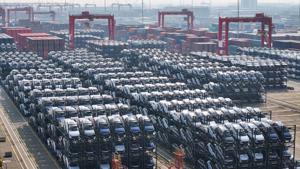Technology
Experts Warn Against Lifting Tariff on Chinese Electric Vehicles

As Canada’s federal government prepares to review the 100% tariff on Chinese electric vehicles (EVs), industry experts are sounding alarms about the potential impact of lifting the tariff. They warn that eliminating this measure could pose a significant threat to the Canadian automotive sector. The review is scheduled to conclude by October 1, 2023, as the government assesses the current trade environment.
Brian Kingston, CEO of the Canadian Vehicle Manufacturers’ Association, emphasized the necessity of maintaining the tariff. He stated that removing it would represent “an existential threat” to the automotive industry in Canada. Kingston highlighted the risk of retaliation from the United States, which has already expressed concerns about the implications of Canada’s tariffs on its own automotive sector.
“Getting rid of it would be an existential threat to the industry. Look at other countries that have been asleep at the switch on this one,” Kingston stated. His remarks underscore the urgency surrounding the review, especially as the Canadian government seeks to navigate broader trade relationships with China amidst ongoing tensions.
The tariff was introduced nearly a year ago in response to aggressive pricing strategies from Chinese manufacturers. Following the implementation of Canada’s tariff, China retaliated with a 100% levy on Canadian canola, illustrating the delicate balance in international trade relations. Kingston pointed out that the market for Chinese-produced cars is expanding rapidly, particularly in Mexico, where sales of Chinese vehicles soared from just 4% in 2020 to about a third of all new car sales today.
“Opening the door to cheaper Chinese EVs is a risk we cannot afford to take,” Kingston added. This sentiment was echoed by Flavio Volpe, CEO of the Canadian Automotive Parts Manufacturers Association (APMA), who warned that allowing brands like BYD and XPeng into the Canadian market could severely undermine sales for North American, European, and Japanese vehicles.
Volpe explained that the pricing strategies employed by Chinese manufacturers, often selling vehicles below their manufacturing costs, threaten to disrupt the market. He contended that these practices are indicative of a larger oversupply issue, stating, “When they’re going to sell you a $13,000 vehicle, do you think it costs $13,000 to make it?”
The potential fallout extends beyond just lost sales. Volpe warned that market share loss for established manufacturers could result in fewer vehicles produced, subsequently leading to job losses across the sector. He emphasized the absence of Canadian sourcing in Chinese vehicles, further complicating the situation. “There isn’t anybody in raw materials, parts, sales, and after-service who thinks it’s a good idea to give away the market to centrally planned, overly subsidized competitors,” Volpe stated.
Concerns were also raised by Catherine Cobden, CEO of the Canadian Steel Producers Association, who highlighted the interconnectedness of the automotive and steel industries. She argued that any changes to tariffs on Chinese EVs or steel would be detrimental to North American manufacturing. “Changing or dropping the tariffs would be a backwards step,” Cobden said, reinforcing the rationale for maintaining these protections.
The government has described the review of the tariffs as a routine assessment. A federal official stated, “Canada will always defend Canadian workers, support our manufacturing sector, and strengthen our trade relationships.”
Federal Agriculture Minister Heath MacDonald remarked that while reducing the tariff on Chinese EVs is under consideration, the government is mindful of other trade implications, particularly in relation to the U.S. market. He stated, “Every decision that we make as a federal government, we want to ensure that we’re not jeopardizing a situation that could be ever broader.”
As discussions continue, industry leaders emphasize the need for a strategic approach to maintain Canadian jobs and protect the domestic automotive market. Unifor national president Lana Payne warned that eliminating the tariff would jeopardize Canadian workers and the economy. “Removing the tariff guardrails that are keeping unfair Chinese EV imports from flooding our home market would be the worst thing our government can do,” Payne asserted.
The outcome of this review will be crucial not only for the automotive industry but also for Canada’s broader economic landscape as it navigates complex international trade dynamics.
-

 World3 months ago
World3 months agoScientists Unearth Ancient Antarctic Ice to Unlock Climate Secrets
-

 Entertainment4 months ago
Entertainment4 months agoTrump and McCormick to Announce $70 Billion Energy Investments
-

 Lifestyle3 months ago
Lifestyle3 months agoTransLink Launches Food Truck Program to Boost Revenue in Vancouver
-

 Science4 months ago
Science4 months agoFour Astronauts Return to Earth After International Space Station Mission
-

 Technology2 months ago
Technology2 months agoApple Notes Enhances Functionality with Markdown Support in macOS 26
-

 Top Stories2 weeks ago
Top Stories2 weeks agoUrgent Update: Fatal Crash on Highway 99 Claims Life of Pitt Meadows Man
-

 Sports3 months ago
Sports3 months agoSearch Underway for Missing Hunter Amid Hokkaido Bear Emergency
-

 Politics3 months ago
Politics3 months agoUkrainian Tennis Star Elina Svitolina Faces Death Threats Online
-

 Technology3 months ago
Technology3 months agoFrosthaven Launches Early Access on July 31, 2025
-

 Politics3 months ago
Politics3 months agoCarney Engages First Nations Leaders at Development Law Summit
-

 Entertainment3 months ago
Entertainment3 months agoCalgary Theatre Troupe Revives Magic at Winnipeg Fringe Festival
-

 Politics2 weeks ago
Politics2 weeks agoShutdown Reflects Democratic Struggles Amid Economic Concerns




















